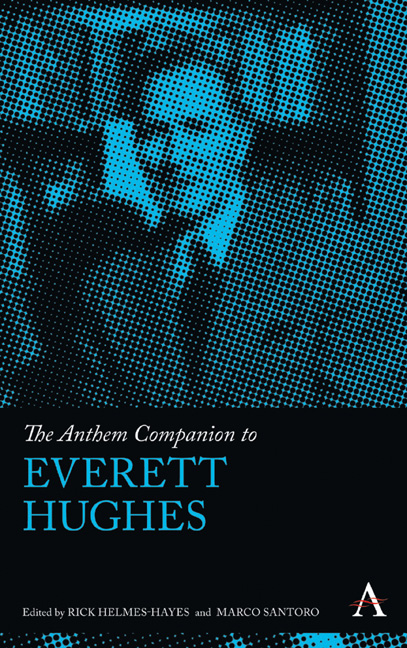Book contents
- Frontmatter
- CONTENTS
- List of Illustrations
- Foreword Everett C. Hughes, Great Teacher
- Insight through Craftsmanship: The Sociological Legacy of Everett Hughes
- Chapter One Everett Hughes and the Chicago Tradition
- Chapter Two Studying “Going Concerns”: Everett C. Hughes on Method
- Chapter Three The Natural History of Everett Cherrington Hughes: A Master of Fieldwork
- Chapter Four Everett C. Hughes: A Key Figure of the Canadian Chicago School Diaspora
- Chapter Five Everett Hughes: Notes from an Apprentice
- Chapter Six An American in Frankfurt: Everett C. Hughes's Unpublished Book on Germans after the End of the Nazi Regime
- Chapter Seven The Origins and Evolution of Everett Hughes's Concept: ‘Master Status’
- Chapter Eight Discovering the Secret of Excellence: Everett Hughes as a Source of Inspiration in Researching Creative Careers
- Chapter Nine Everett Hughes on Race: Wedded to an Antiquated Paradigm
- Notes on Contributors
- Index of Names
- Index of Subjects
Chapter Three - The Natural History of Everett Cherrington Hughes: A Master of Fieldwork
Published online by Cambridge University Press: 17 June 2017
- Frontmatter
- CONTENTS
- List of Illustrations
- Foreword Everett C. Hughes, Great Teacher
- Insight through Craftsmanship: The Sociological Legacy of Everett Hughes
- Chapter One Everett Hughes and the Chicago Tradition
- Chapter Two Studying “Going Concerns”: Everett C. Hughes on Method
- Chapter Three The Natural History of Everett Cherrington Hughes: A Master of Fieldwork
- Chapter Four Everett C. Hughes: A Key Figure of the Canadian Chicago School Diaspora
- Chapter Five Everett Hughes: Notes from an Apprentice
- Chapter Six An American in Frankfurt: Everett C. Hughes's Unpublished Book on Germans after the End of the Nazi Regime
- Chapter Seven The Origins and Evolution of Everett Hughes's Concept: ‘Master Status’
- Chapter Eight Discovering the Secret of Excellence: Everett Hughes as a Source of Inspiration in Researching Creative Careers
- Chapter Nine Everett Hughes on Race: Wedded to an Antiquated Paradigm
- Notes on Contributors
- Index of Names
- Index of Subjects
Summary
Introduction
The sociology of Everett Cherrington Hughes (1897–1983) is probably today one of the most underestimated contributions to the discipline. Writing in 1998, Rick Helmes-Hayes lamented that Hughes had ‘more or less disappeared from the institutionalized collective memory – especially the textbooks – which constitute the formal history of the discipline’ (1998: 658). But has Hughes disappeared from the discipline’ collective memory? Has he fallen into the ‘tomb of forgotten men’, to use his own metaphor for describing the oblivion into which once notable people sometimes pass? In the pages that follow, I argue that he has not. Indeed, even if he is largely overlooked by the authors of textbooks, over the past two decades his work has enjoyed a substantial resurgence. This revival has taken place largely through the efforts of his former American and Canadian students, most notably Howard S. Becker, who have worked diligently to highlight his intellectual legacy. Indeed, Becker’ Tricks of the Trade(1998) is perhaps the most brilliant testimony to a Hughesian sociology yet written and constitutes clear evidence of the benefits of a long intellectual companionship with Hughes. In France, since the 1980s, there has been increased interest in Chicago’ fieldwork-based sociology among sociologists and anthropologists (including Jean-Michel Chapoulie, Jean-Pierre Briand, Pierre Fournier, Jean Peneff and Henri Peretz). Among their publications, Peneff’ Le goût de l'observation(2009) is a clear indicator of Hughes’ current impact on the discipline.
In this chapter I take the biographical path to investigate and illuminate the sociological life and work of Hughes, focusing in particular on his contributions to the development of fieldwork. Hughes can be considered a master of fieldwork and of fieldwork training, and his insistence on the importance of both of these dimensions of sociology is both a striking characteristic of his career and a disposition deeply rooted in his habitus from his youth. Hughes defined fieldwork as the ‘observation of people in situ;finding them where they are, staying with them in some role which, while acceptable to them, will allow both intimate observation of certain parts of their behavior, and reporting it in ways useful to social science but not harmful to those observed’ (1971: 496).
- Type
- Chapter
- Information
- The Anthem Companion to Everett Hughes , pp. 93 - 114Publisher: Anthem PressPrint publication year: 2016

